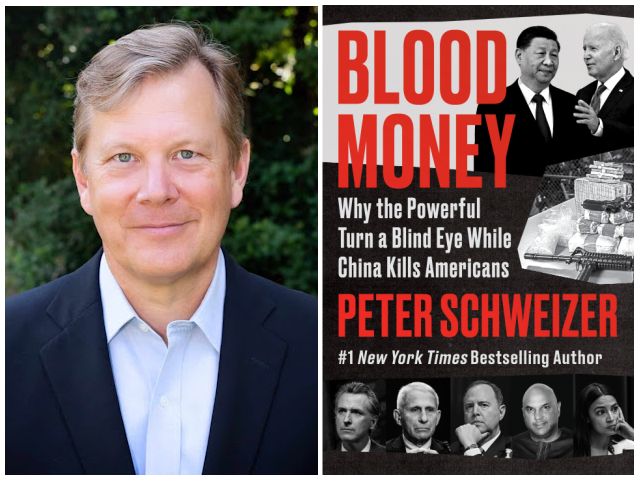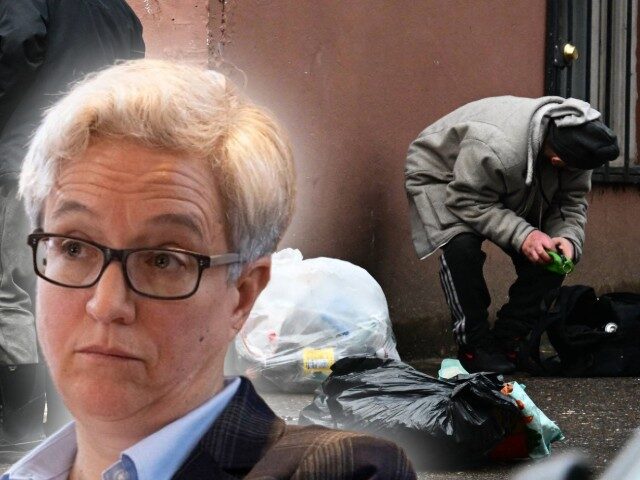Oregon’s fentanyl-induced public health crisis is coming to a head, with lawmakers quickly back-tracking on drug decriminalization after the state saw a whopping 1,530 percent surge in overdoses.
Gov. Tina Kotek, Multnomah County Chair Jessica Vega Pederson, and Portland Mayor Ted Wheeler — all Democrats — announced a 90-day state of emergency order on January 30 to commit crisis resources to a “unified response.”
Officials in Deschutes County, in central Oregon, declared their own state of emergency just over a week later when first responders in the city of Bend had to cover four separate fentanyl overdoses in a span of just six hours.
The dramatic increase in fentanyl-related overdoses and deaths follows the 2020 passing of Measure 110, a drug decriminalization law that most Oregonians now believe to be a grave mistake.

A person lies on the street in the Old Town Chinatown neighborhood in downtown Portland, Oregon, on January 25, 2024. (PATRICK T. FALLON/AFP via Getty Images)
The problem is not just relegated to metropolitan areas and downtowns. In the more rural areas of Oregon, local leaders are begging state officials for help.
“We have a crisis on our hands, and that’s easy to see,” said State Rep. Lucetta Elmer (R), whose district spans areas in Polk and Yamhill counties about an hour south of Portland.
“We have drugs that are just rampant, and we’re seeing public drug use daily,” she added. “Extreme homelessness and garbage everywhere. It’s unsafe and it’s unsightly, but it’s also heartbreaking because literally, our fellow citizens are dying.”
While the majority of Oregon counties vote conservatively, they are “consistently outnumbered by urban liberals,” a Fox News analysis found.
Elmer hosted a roundtable in December where other local leaders “overwhelmingly” agreed that Gov. Kotek’s fentanyl crisis resources should extend beyond Portland to the forgotten areas of the state.
“They want to see it get to all of Oregon,” the representative said. “They’re crying for that. We need to see that things are going to change.”
Part of Kotek’s emergency strategy is to focus on harm reduction rather than cracking down on open drug usage.
Officer Donny Mathew of the Portland Police Bureau was biking through the city when he said he noticed a man using fentanyl on a sidewalk.
“He was still actively smoking right when we rolled up,” he told CNN.

A person smokes a foil of fentanyl on Park Avenue following the decriminalization of all drugs in downtown Portland, Oregon, on January 23, 2024. (PATRICK T. FALLON/AFP via Getty Images)
Mathew handed the drug user a $100 citation — along with a card with a phone number that could help erase that new fine.
“They call this hotline, and they can get the citation paid for,” the officer said, explaining how offenders must speak with substance abuse counselors and agree to a medical screening.
While Kotek is attempting to use such measures to curb the fentanyl problem, state lawmakers “overwhelmingly approved” a bill to reverse Measure 110, the outlet reported.
Though the recriminalization measure has sailed through both the state House and Senate, Kotek still has not decided whether or not to sign it, a spokesperson told CNN on Sunday.
The fentanyl problem may be more pronounced in Oregon, but it is sweeping the entire nation — and the culprits may be unexpected.
Many blame Mexican cartels for poisoning Americans, and they have demonstrably played a substantial role. However, the masterminds are arguably within the United States borders and in the Far East.
The Biden family made off with $5 million from the business partner of the “White Wolf,” a Chinese criminal gang leader who helped create the fentanyl pipeline now decimating the U.S., the new book Blood Money: Why the Powerful Turn a Blind Eye While China Kills Americans reveals.
In his latest release, seven-time New York Times best-selling author Peter Schweizer dives deep into the masterful criminal organizations entrenched in the Chinese government and Democrat Party that have fueled this epidemic.

Peter Schweizer, author of Blood Money (BNN)
In an interview with Schweizer, Donald Trump Jr. called the book a “must-read” that shows the “interconnectivity between our politicians and the Chinese Communist Party.”

COMMENTS
Please let us know if you're having issues with commenting.